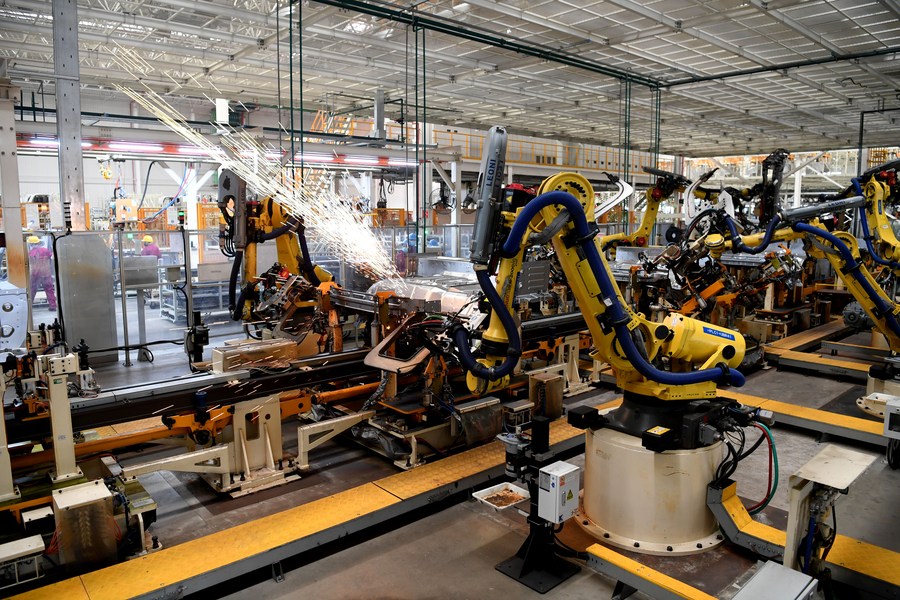Factory data pointing to solid economic rebound

Photo taken on April 21, 2022 shows a truck assembly line at a production base of Anhui Jianghuai Automobile Group Co., Ltd. in Hefei, East China's Anhui province. [Photo/Xinhua]
China's factory activity improved substantially in May compared with April, proof that the economy is rebounding solidly and should pick up in pace in the months ahead.
Officials and industry experts said the momentum of the recovery will continue as the State Council, China's Cabinet, is putting a package of 33 economic stimulus measures into place.
They said China's economic recovery is likely to accelerate as regions hit hard by outbreaks of COVID-19 gradually return to normalcy, amid expectations of stronger policy easing on the fiscal and monetary fronts with more infrastructure spending and additional cuts in the reserve requirement ratio due to kick in as well.
The official purchasing managers index for China's manufacturing sector was at 49.6 in May, an improvement over April's reading of 47.4, the National Bureau of Statistics said on Tuesday.
A PMI reading above 50 means economic expansion, while one below 50 signals contraction.
Zhao Qinghe, a senior statistician at the NBS, said that while China's economy has been severely affected by the COVID-19 pandemic and changes in the international situation, work and production have resumed gradually in hard-hit regions.
China's nonmanufacturing PMI was at 47.8, after a reading of 41.9 in April. The country's official composite PMI, which includes both manufacturing and service activities, came in at 48.4, compared with 42.7 in April, the NBS said.
Wen Bin, chief researcher at China Minsheng Bank, attributed the improvement in PMI readings to the government's stronger macro policy support and the gradual resumption of work and production amid better control of the pandemic.
The State Council unveiled a new document on Tuesday urging implementation of a package of detailed policy measures to boost the economy.
Zhao Chenxin, deputy head of the National Development and Reform Commission, said at a news conference in Beijing on Tuesday that the country will make a big push to implement the package of policy measures to strengthen the economy with stronger macro policy adjustments.
More efforts will be made to expand demand, ensure the safety and stability of food, energy, and industrial and supply chains, speed up resumption of work and production in key sectors and ensure supplies and stable prices of commodities essential for people's livelihood.
Xu Xiaolan, vice-minister of industry and information technology, said China has seen a quicker pace in the resumption of work and production in key sectors and regions, and the industrial economy is showing signs of improvement and stability.
Given China's various industrial categories, its complete support system and strong resilience, Xu said it has ample room for maneuver, and the long-term prospects of its fundamentals and the steady trend of its recovery remain unchanged.
Xu said a new document will be issued this week to foster and cultivate small and medium-sized enterprises, especially sophisticated enterprises that specialize and produce new and unique products, helping to enhance their overall strength and core competitiveness.
To boost the industrial economy, Xu said the ministry will ramp up efforts to stabilize the industrial and supply chains of key sectors, implement front-loaded and targeted policies, expand investment and boost consumption.
"Beyond the near term, policy stimulus will play a crucial role in boosting domestic demand this year," said Tommy Wu, lead economist at the Oxford Economics think tank.
"We think infrastructure investment will be relatively more effective in boosting growth than other stimulus. Targeted monetary easing to support industrial and the real estate sectors could be effective now, while more broad-based easing could be useful when business confidence stabilizes."
Wu said he expects growth to start picking up more visibly in June as the think tank anticipates Shanghai gradually returning to normal.
Robin Xing, Morgan Stanley's chief China economist, said while the pandemic has severely affected China's economy, the worst seems to be over.
Morgan Stanley's China economics midyear outlook said they expect a quarter-on-quarter contraction in the second quarter due to COVID-19 outbreaks and a pickup in the third quarter before a more visible rebound from the fourth quarter of the year and into 2023.
Photos
Related Stories
- China's growth remains a stabilizer for world economy
- Chinese economy resilient despite short-term downward pressure
- Xi Focus: Steering Chinese economy toward a brighter future
- Key rate cut gives market major boost
- Economic Watch: With lending rate cut, China increases support for economic growth
- Opening-up to further boost global recovery
- Trend of stable economic performance remains unchanged in China
- Economy likely to recover after April doldrums
- China's economy expected to recover gradually from Omicron impacts: spokesperson
- Nation to prioritize economic stability
Copyright © 2022 People's Daily Online. All Rights Reserved.










